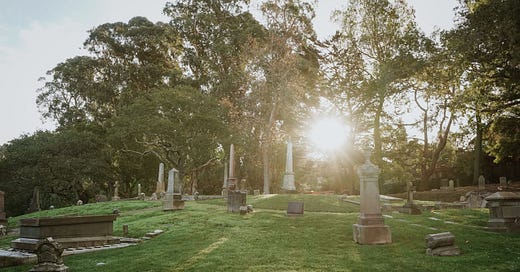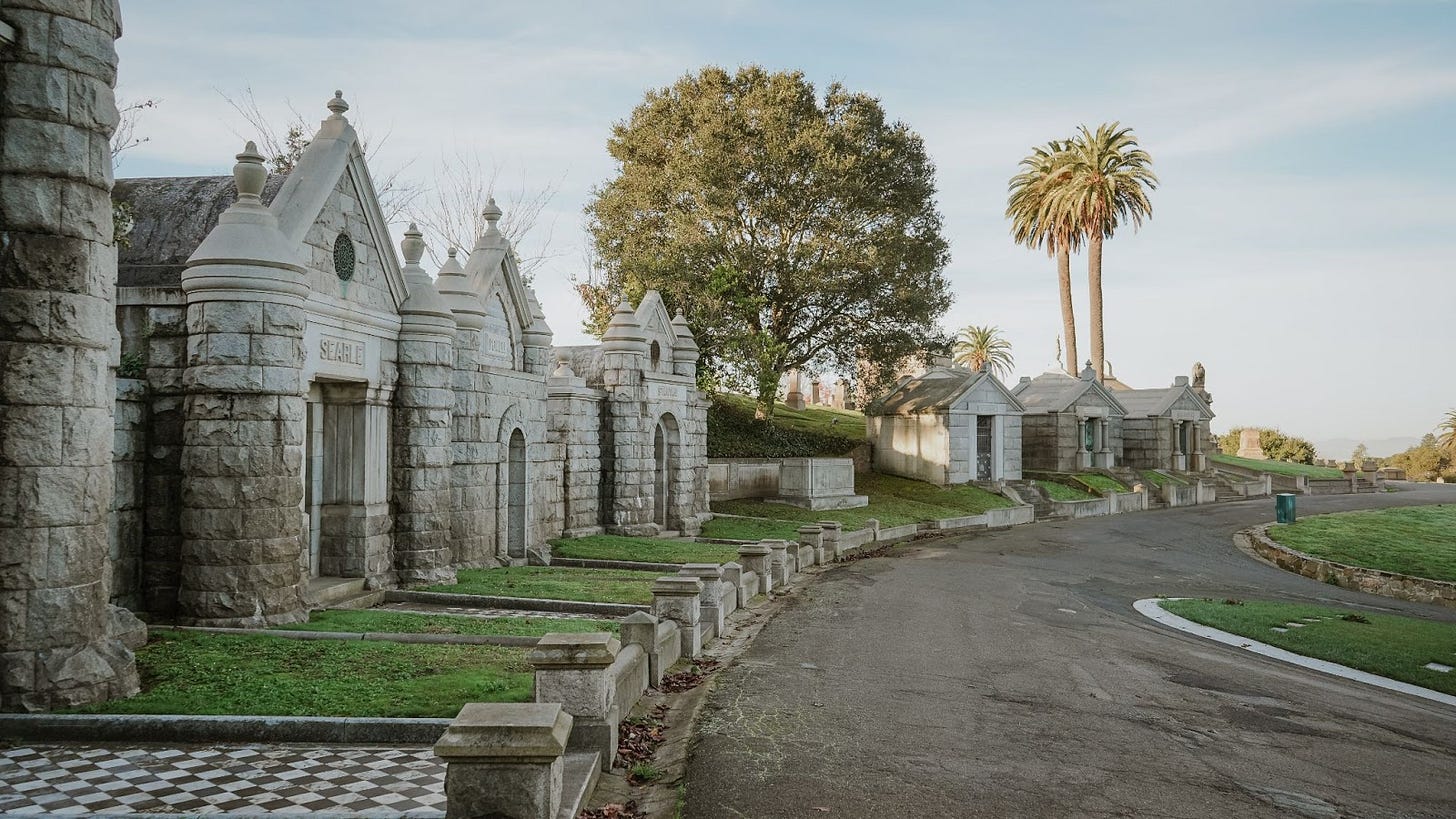The first grim reminder popped up on my phone Sunday morning: “Don’t forget, you’re going to die.”
Later that afternoon, I received another death warning. By the end of the day, I’d gotten five reminders that I would perish.
The death notifications came from an app called WeCroak, which, according to the founders, was inspired by the Bhutanese folk saying, “To be a truly happy person, one must contemplate death five times daily.”
The app is as simple as they come. Several times a day, it sends you a push notification with the same message, “Don’t forget, you’re going to die.” From there, you can open the app to read a quote about death. My favorite quote I’ve seen so far is from writer Susan Cheever: “Death is terrifying because it is so ordinary. It happens all the time.”
I’d heard about WeCroak before, but never felt the need to download it. I already contemplate death plenty often; I regularly think about the people I love who have died and worry about losing the people I love who are still alive. Why would I need an app to remind me about dying?
Lately, though, it’s dawned on me that I’ve lost sight of what’s important in life. Between not getting enough sleep, adjusting to a new home and routine, and trying to juggle parenting with working, my patience and energy reserves have been running worryingly low. I find myself getting discouraged more easily. Minor inconveniences tend to overly frustrate me. And, like many new parents, Billy and I have been bickering more than usual.
Suddenly, the small things seem big. Meanwhile, I’ve lost touch with the actual big things — like the fact that life won’t last forever.
I don’t mind the thought of dying. What I do mind, though — and what I don’t reflect on nearly enough — is that death means that everything ends. There will be no more newsletters to write, no more kisses to give, no more fights to have, no more bills to pay, no more laughs to share, no more walks to take, no more counters to clean, no more chances to complain about not getting enough sleep.
In other words: The small stuff doesn’t matter nearly as much as I think it does.
On a recent episode of Forever35, author Beth Pickens spoke about her daily death ritual, which she described as an act of self-care. Each day, Pickens takes a moment and writes down one thing that reminds her that she will eventually die.
Pickens’ voice was light and joyful as she described the routine. “It is the most grounding thing to liberate me from whatever garbage is keeping me up, or weighing me down, or making me feel crazy,” she said. “It’s just like this momentary pause that liberates me from myself.”
As I listened to Pickens, a lightbulb went off. This is what I need! I, too, could benefit from a daily pause that grounds me in the moment. I could use a reminder that most of the things I complain and worry about don’t actually matter in the grand scheme of things.
After listening to Pickens’ interview, I downloaded the WeCroak app. It was time to remember what was most important.
After Jamie died, I thought about death a lot. I contemplated his death, of course, but also the fact that we will all die, but we’ll never know when.
It seems that considering mortality would make a depressing time more depressing, but it did the opposite. Remembering that death was inevitable reminded me to prioritize the important things in life. I made it a point to tell people that I loved them. I let long-standing grudges go. I found the courage to do things that I had previously been too scared to try.
Grief clarified things for me in a way that I sometimes miss. As Jayson Greene wrote in Once More We Saw Stars, “Grief at its peak has a terrible beauty to it, a blinding fission of every emotion. The world is charged with significance, with meaning, and the world around you, normally so solid and implacable, suddenly looks thin, translucent.”
When you’re coping with a major loss, you don’t have to remind yourself that life is short. For better or worse, it’s a fact that you can’t forget.
At some point, though, I stopped giving so much thought to the fact that we’re all going to die. Sure, my mind jumps to worst-case scenarios any time Billy complains about a mysterious pain or doesn’t quickly pick up the phone. Ditto for whenever a friend who normally texts me decides, out of the blue, to call. And like most new parents, I’ve done the middle-of-the-nighttime check to make sure our daughter is still breathing. But those thoughts and actions are all fear-based — they’re not conscious and contemplative choices.
I rarely give myself the time or space to consider the temporality of life, in part because I’m usually thinking about more mundane and pressing things, like whether we have enough diapers on hand or when I last showered. But it’s times like this — when I’m especially exhausted and irritable — that it’s most crucial to ground myself and remember what truly matters.
A few weeks ago, I read about another, less-morbid approach to reframing daily life. The ancient Stoics believed that when you are doing a particular task, you should reflect on the possibility that this might be the last time you do it.
I learned about the Stoics’ last-time meditation from Kevin Maguire’s newsletter, The New Fatherhood. He wrote:
I've done it a few times over the last month and it's been such a great exercise. Cycling back from school in the rain? I imagined it was the last time I'd feel raindrops hitting my face. Changing the nappy of my son? I realised (thankfully) that I won’t be doing this for much longer and, one day, I'll probably miss it.
I’ve also tried this approach and can vouch that it works. Getting up to soothe my crying baby in the middle of the night can be exhausting, but I can lessen that burden by remembering that, before I know it, she will no longer be a little baby who cries. Even something as heavy as an argument with Billy feels a lot lighter when I consider that I may not always have the opportunity to bicker with him.
All I have is today, this very moment. It’s on me to decide whether I want to savor it. And if I forget to do that? The WeCroak app is there to remind me, “Don’t forget, you’re going to die.”
xoxo KHG
p.s. There always comes a point when we discover that life is finite. When was yours? Did you lose a pet or a relative? How old were you? How was death explained to you? Looking back now, how does that moment make you feel?
As a new parent who’s already thinking about the tough conversations I’ll have to have with my kiddo someday, I’d love to hear your reflections. Reply to this email, leave a comment, or send me a message. I’ll feature your replies in Friday’s subscriber-only newsletter.
💖 Sharing is caring


Thank you, Anna Marie! Eye-opening and comforting is a combination I can totally get behind.
🥁 We’ve got winners!
It’s time to announce which subscribers will receive a handwritten, in-case-of-emergency pep talk from me. Drumroll, please ...
The five winners are: Shannon Simcox, Paulina Firozi, Katie Hatch, Katie L., and Nicole Vas.
Congrats, readers! You’ll get some words of encouragement in the mail very soon. And thank you to everyone who became a subscriber over the past few weeks. We’re getting ever closer to the goal of 500 paying subscribers and 5,000 readers in 2021.
Let’s do another drumroll, shall we? ...
As of this week, we’re at 462 subscribers and 4,894 readers. Hooray! I’m over the moon at how much this little newsletter has grown.
As always, this newsletter wouldn’t be possible without all of the wonderful people who support it. Thank you all so much.
My Sweet Dumb Brain is written by Katie Hawkins-Gaar. It’s edited by Rebecca Coates, who is remembering her Dad. He died a year ago, yesterday. Appropriately, the fleeting nature of life has been at the forefront of her mind. Photos by Madeleine Maguire on Unsplash.
This newsletter contains a Bookshop.org affiliate link.







I was lucky to be around my great-grandmothers, who both lived to be more than 100. I watched them age and saw my grandparents care for them. When they died, my mom took us to their funerals and talked with us about their open caskets. I remember that it was scary, but also my family was all there and we celebrated these people we loved. I think that early experience has informed how I write obits now for the Tampa Bay Times. I know there will be sadness, joy and lots of complicated feelings. I also read obits regularly, both in search of stories and a way to see how people spent their precious lives.
22 years ago my friends sister died in a car wreck... she was 15 years old... and I was 17 at the time... I walked outside to get my moms mail a day later and thought why is everything still going? Why are cars still moving down the road, etc? Nothing stopped but she did... then a few days later my own best friend committed suicide.. she ended her life. She knew what she wanted to do... so yes, I had that moment of discovery... my grandmother and grandfather died rather young *just like my mother*-- and I realize you really truly never know... I think about this pretty often. Death still frightens me but I need to learn not to let it...